Suki Waterhouse on turning to music with debut album ‘I Can’t Let Go’
The London born model-actor-singer speaks with Rolling Stone UK ahead of her biggest year yet: the release of her debut album and a starring role in the fiercely anticipated TV adaptation of Daisy Jones & The Six
By Hannah Ewens
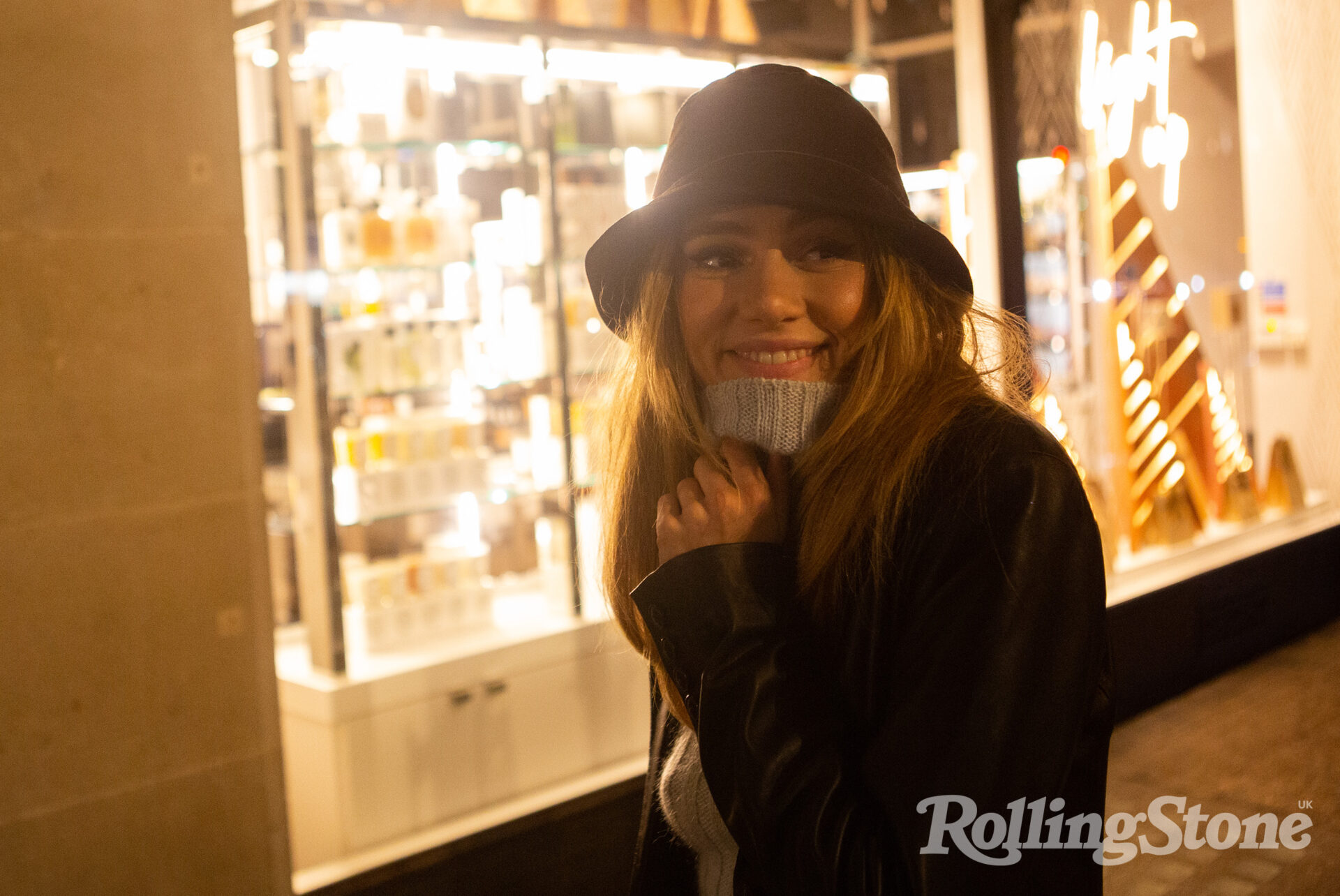
Suki Waterhouse was Kate Moss for younger millennials. When talking about British fashion of the past decade, her name sits comfortably alongside JW Anderson, Simone Rocha, Topshop, streetwear and Cara Delevingne. She was barely out of her teens before she was sought out for Burberry campaigns and the covers of Vogue, Elle and Tatler.
A segue into acting came with a role as a hot nightmare in Love, Rosie (2014). “I’d never been on a movie set before and I got to play this bitchy, horrible girl,” she laughs, as she speaks from her pristine London home in December 2021.
Over the past six years, she’s had a cameo in the Absolutely Fabulous movie, worked alongside Hari Nef, Abra and Odessa Young in Assassination Nation and bagged the lead role in a handful of projects.
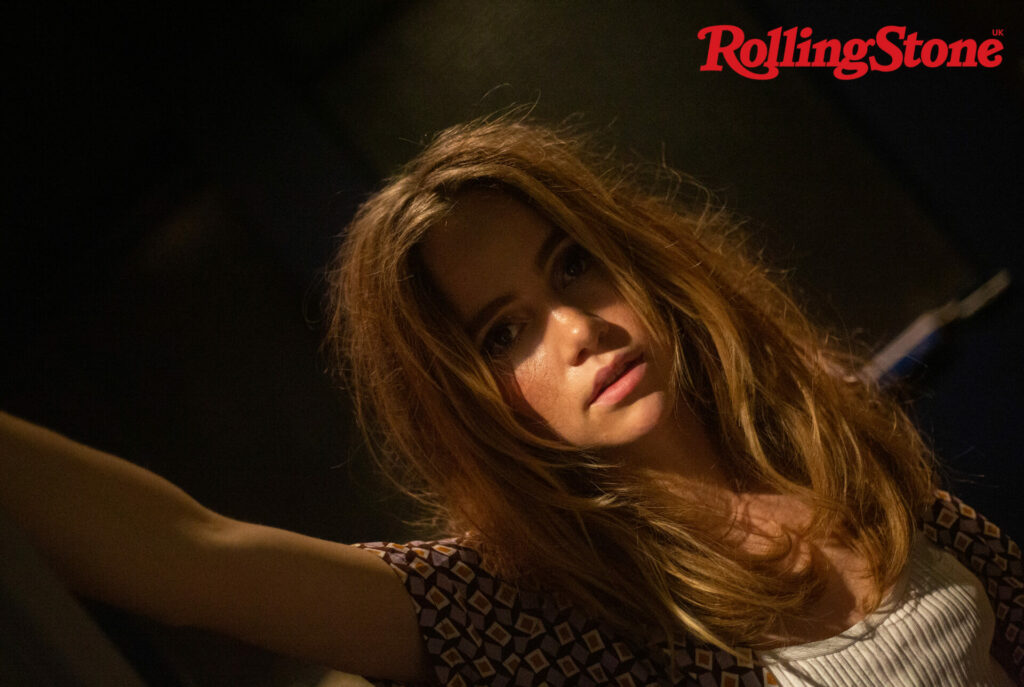
Suki Waterhouse poses for Rolling Stone UK (Picture: Jamie MacMillan). 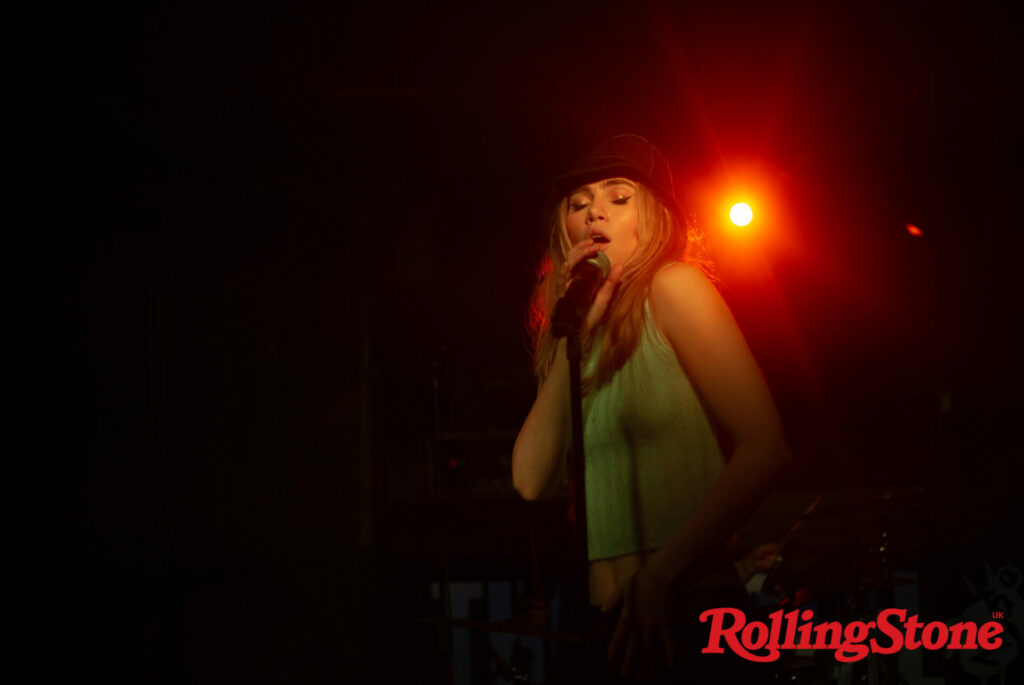
Suki Waterhouse performs live (Picture: Jamie MacMillan). 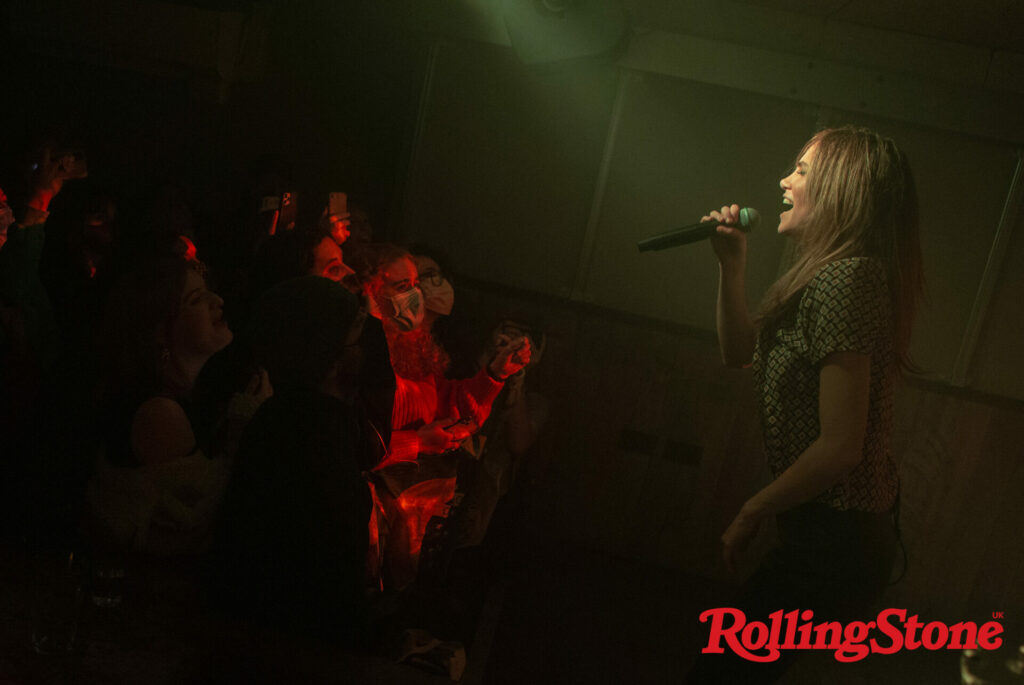
Suki Waterhouse performs live (Picture: Jamie MacMillan). 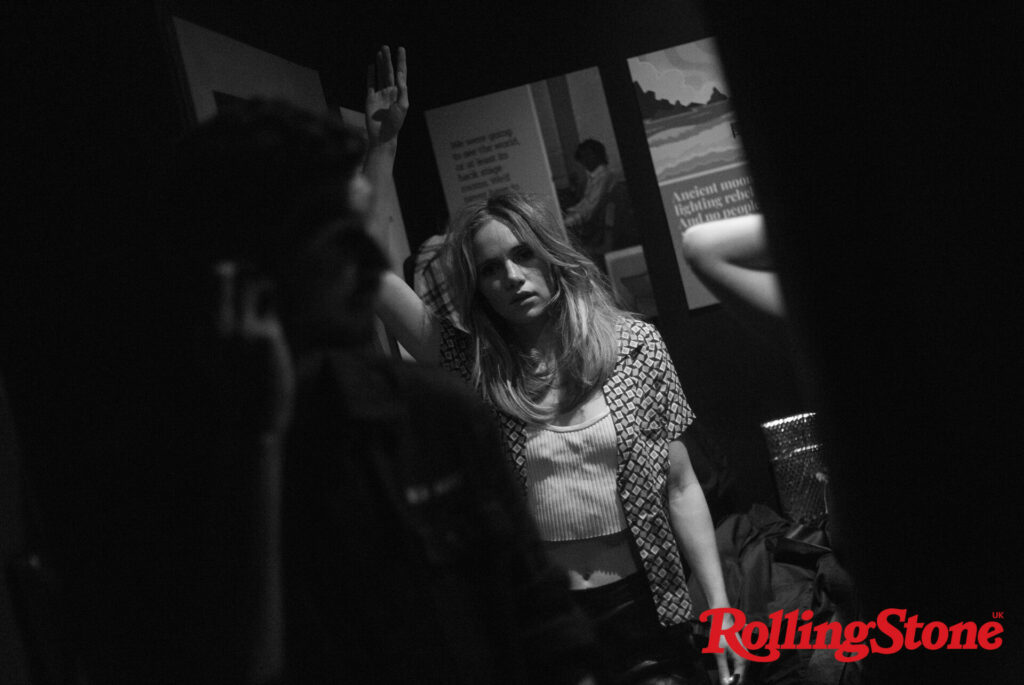
Suki Waterhouse poses for Rolling Stone UK (Picture: Jamie MacMillan). 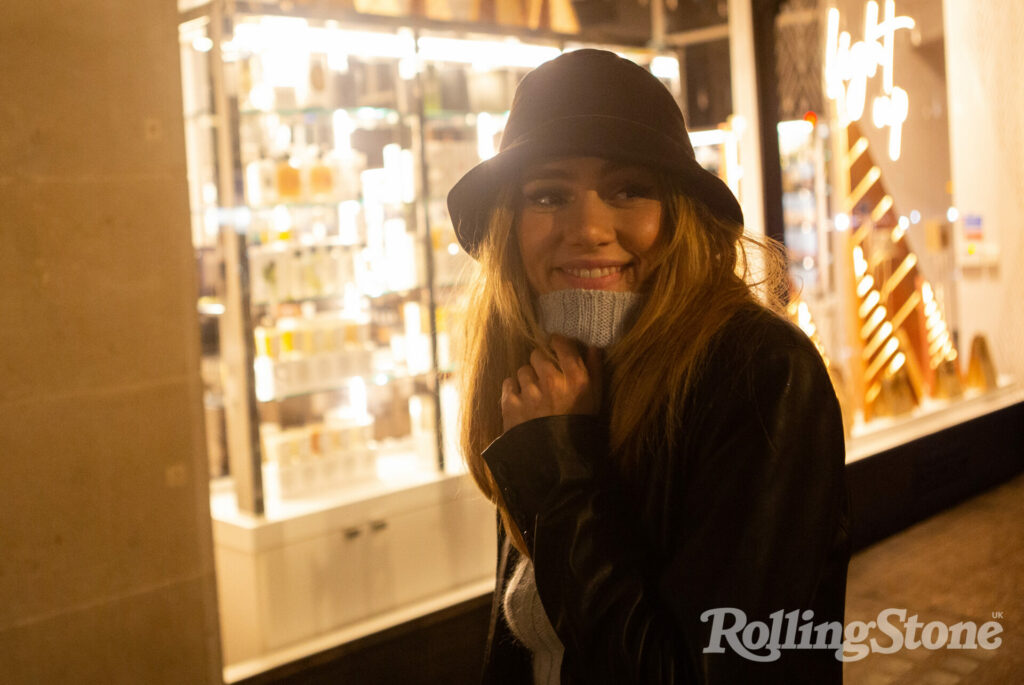
Suki Waterhouse poses for Rolling Stone UK (Picture: Jamie MacMillan). 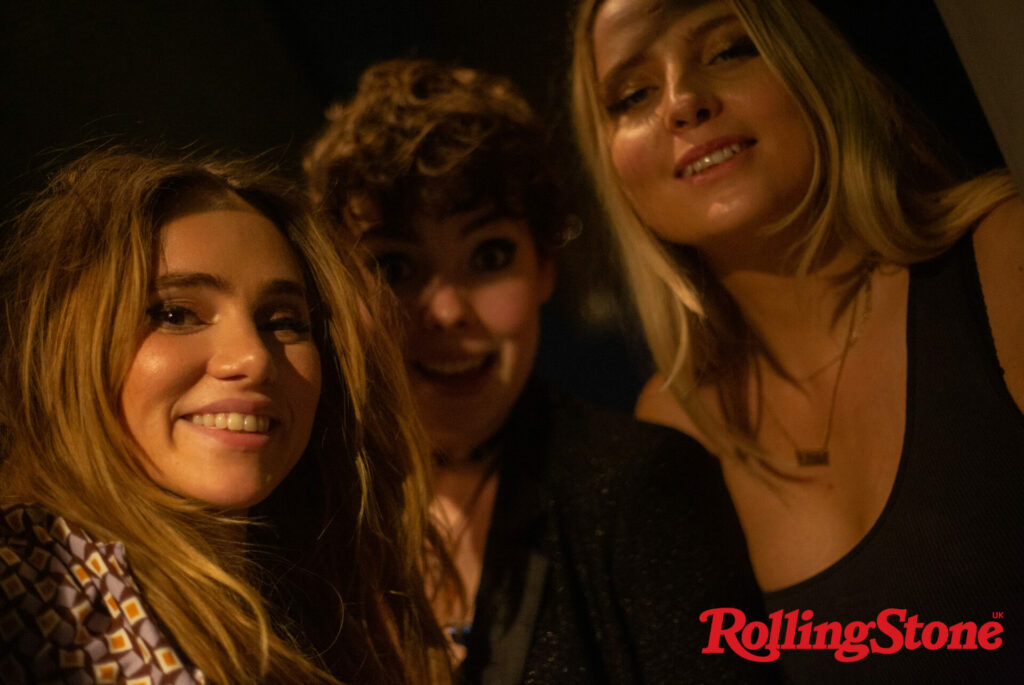
Suki Waterhouse backstage (Picture: Jamie MacMillan).
It’s fair to say, then, that music is not the first thing you associate with Waterhouse. Her credentials mean that as a new indie pop artist she faces anything from wariness to snobbishness. Back in 2016, she released her first single, ‘Brutally’, a simple acoustic guitar and piano track about heartbreak. It never led to a larger release. Curiously, since then, she’s uploaded no more than a single song most years.
Speaking to Rolling Stone UK the month before her 30th birthday, she explains why she’s finally ready to release a body of work she’s spent her twenties working on.
We also speak about the playfulness that characterised London’s fashion scene in the early 2010s, as well as the industry’s darker side, her romantic relationships, debut album, I Can’t Let Go, and her biggest role yet as Karen Sirko in the upcoming fictional, biopic-style series, Daisy Jones & the Six. When we begin talking, Waterhouse recalls drinking to calm her nerves ahead of performing her new songs at The Social in London, where these photographs were taken.

As Brits we’re very critical and historically so are the British cultural industries, so it’s no wonder you were nervous about your first show in London.
The critics are so tough. Oh my God. They drive me nuts. I first put out ‘Brutally’ and to me it was the greatest thing ever. I put out the song completely DIY, [with] no people helping me. I think the song got, like, eight million streams. And it was so encouraging and kind of amazing. And the British press are like: failed popstar, not top 200. And then that’s just the line for years.
You haven’t released much music since then. Why is that?
I started writing in a depression that I went into at about 23. I was just incredibly alone at that moment. ‘Brutally’, in particular, came out of an incredibly toxic public breakup. I made it in my room, recorded it — it’s all acoustic, not a lot of production at all. But since then I’ve basically been working on this album for the past seven years. Only now am I at the point of being ready to put it out. It’s a mixture of having the courage to do so, being able to be vulnerable enough to share what I’ve written and, also: am I in a strong enough place to deal with the comfortability of something this confessional? It’s more about being ready and it’s taken me a long time to be ready.
“I’ve basically been working on this album for the past seven years. Only now am I at the point of being ready to put it out”
The album I called I Can’t Let Go, because I was struggling with wondering if the ways that I was using to fill voids… wondering, ‘Will I ever be able to quench this thirst that I have for fucking up my life?’ That is the amazing thing with completing something. When you share your art, that’s such an incredibly healing process.
It’s making me think of Adele’s 30 and what she told Rolling Stone about having her astrological ‘Saturn return’ during her divorce and writing about that. It’s a similar situation of reflecting on that young adult part of your life and it being internally difficult but healing. Do you relate to that — and furthermore, do you follow astrology?
Yeah, it’s actually taken me quite a long time to release a lot of shame around being really young and growing up somewhat publicly. That breakup was the first one that was so public and with someone older and it was very toxic and I was suddenly young and just reading the most hateful things about myself.
It’s kind of like your [Freudian] id: everyone’s self-critical, obviously. But then you find these places that are more critical of you than even you could fucking dream up and you’re like, ‘Oh my God.’ You’ve got people for years asking you to disappear and it’s a fucking crazy thing. I’ve finally gotten to a place where I’m like, it doesn’t mean that I can’t slip. I’m human. Being older now, I can kind of understand the psychology of why some people will just have that reaction to you.
But I had to delete all my astrology apps because I was away the year before last filming [Seance, 2021] and it was fucking freezing there and a very isolating experience. And I just obsessed over the astrology apps and would call my boyfriend [Robert Pattinson], breaking down about something I’d read. I was turning into a completely crazy person. You must delete them. Nothing came true. The Pattern [an astrology app] is particularly misleading.

Yes, modern astrology’s individualism was really shown up when we got involved in a global pandemic with a grander narrative for us all. I also find The Pattern particularly addictive and scaremongering.
It’s way too personal. My dad sent this really detailed article to the family WhatsApp about how astrology is linked to narcissism and if you are highly intelligent then you don’t believe it. Me and my three sisters were all attacking him back, like, “Shut up, Dad, you dunno what you’re talking about.”
You were first approached to be a model in a London clothes shop. Do you remember what happened on that day? It was such a phenomenon for suburban teen girls in London on a day out. “I’ll go to Oxford Street Topshop and I’m gonna dress really nicely. Maybe I’ll be model-scouted…”
Maybe in a bowler hat.
Or one of those tight headbands.
And it was Henry Holland tights… do you remember Henry Holland tights with little holes in? There are a lot of horrendous photos of me in that kind of gear around that point. I got scouted and I went to IMG when I was 15 or something. Basically, what I remember of that time is doing a lot of clouding the fact that I wasn’t tall whatsoever. I was always in these Jeffrey Campbell giant platforms — I remember the import fees were crazy for those — they were the only ones I could find that big and I’d wear massive trousers over them. I remember going into the agency and always hiding. They always wanted me to not wear these weird, baggy clothes. And they’d constantly try to put me in a pair of tights and a little skirt.
I was never actually a model-looking person, which was always quite difficult. I’d constantly [get] sat down and told that I was too big or whatever. I definitely remember sobbing at a table full of adults at 16 the first time that happened. But I got quite hardened to it and I was probably quite unhealthy through those years, but I managed to always be able to look at the agency when I was young and be like: “You guys are all losers.” So, it’s cool.
If your modelling career happened randomly and serendipitously, rather than you actively wanting to do it, it possibly made coping easier.
Well, yes. I was quite badly behaved. I got fired from a few agencies, actually. I remember one said, “My friend heard you walking down Old Street slagging us off.” My parents were not involved whatsoever. They were like: “I dunno what you’re doing,” just upset that I wasn’t going to college.
But you look back and there were so many sketchy things that would happen. I remember they used to get you to bring cash. So you’d do a London Fashion Week show or something and then — and this is completely wrong in every way — they’d say: “Meet so-and-so backstage, he’ll give you 200 quid in cash, then you’ve gotta take the bus to Old Street, give us the cash.” And then you would never see it again.
And they’d say: “This has gone into your kitty” — which is the money that they charge you every month for having a book and buying magazines and printing stuff off. You try and challenge them and you basically couldn’t — you just wouldn’t work or you’d be fired.”

It was such a cultural moment. Everyone knew about all our big British models at the tail end of Kate Moss’s reign, even if you weren’t that into fashion. It was tied to London’s creative scene and indie music and amassed into one British millennial experience.
It was an amazing time. That has really gone from whatever’s going on now. There’s not much of a hedonistic, wild nature to it. You could tell the girls had interesting fun and it was all about having a fucking good time. You could be a little bit rough around the edges. It was glamorous in quite an unglamorous way. That whole Christopher Bailey [then fashion designer at Burberry] time was just brilliant. I remember lots of hotel rooms at Claridge’s and everyone would have the whole floor booked out and it would be a fucking riot.
It was followed by Instagram and influencing taking hold of modelling and a sanitisation of certain practices.
Not to say that there’s not loads of positive things that have come out of that change, but it was very much about personality, and I think now it’s, literally, how many followers you’ve got.
What did you want to do around that age before you were roped into modelling?
I was part of this theatre group run by these two really cool women who lived in Hammersmith. I would also spend four or five hours a week at Shepherd’s Bush studios doing pop-star classes. I very much just wanted to get away from school, my house, my family.
How did you transition to acting from modelling?
I was completely and utterly destroyed by modelling and had entered into that depression I mentioned. I think anyone that does modelling exclusively and goes hard at it for a couple of years completely burns out. And I had all this shame around my image and the way I looked. You’ve literally seen every part of your face and you are obsessed with one eye being smaller and reading about how everyone thinks one eye’s smaller. You’ve spent too many years being told your thighs are too big and you just can’t any more. You get put on a plane every single day of your life for years. And I hadn’t sat down for dinner with a friend or family for years, either. I wanted more time for acting and music, too.
“I was completely and utterly destroyed by modelling”
How did you get involved with the Daisy Jones & The Six show?
I was in my agent’s office and saw on a big board behind the office desk: Daisy Jones & The Six. I had the audition sent and then they said the [lead] role’s gone to Riley Keough. I knew there were other roles available and I was just completely possessed. And so my agent got me an audition for Karen. For the audition I did ‘Light My Fire’. My boyfriend was in hell — it was the worst rendition of it ever.
They said I had to be able to play piano and I just said I could learn. There were so many auditions, the process was crazy. It was two Christmases ago. We started filming recently and it was the longest wait, which was great because I had to learn how to be a pianist. So that’s what I did the entire pandemic. I was learning for four hours a day.
We then did four months every day of band camp rehearsal at Sound City. That’s the iconic studio where Fleetwood Mac met and recorded. We’ve also been filming there.
Did you enjoy the original book?
I was pouring all over it for the audition. Everyone says it, but Taylor Jenkins Reid does have this incredible talent for just making you feel like you were there and you really believe that this was a real band. I loved the elements of having us older looking back on the past. Because everything in life doesn’t work out perfectly and beautifully. People don’t end up with the love of their lives and other things break up and fall apart.

Karen is torn between real life and being a musician.
Yeah, for my character, Karen Sirko, music has been her entire life and she’s a complete survivor. She fought her way into a very male-dominated music world. And to even be a touring female musician in a band in the 70s, it’s incredibly rare. She’s torn between the decision to have children and life as a musician, which I guess is what we all have to choose in some way.
Tell me about the songs on your album. I’ve heard there’s a funny story behind ‘Melrose Meltdown’.
That song was born from a trip me and my friend Kristen [Cochrane], who runs the Instagram account @ripannanicolesmith, went on. We really didn’t know each other that well and were both a bit broken and she was heartbroken and just very heavy-hearted at the time. I was single and she was single and I was like, “I’ve always wanted to go to south-east Asia backpacking.”
We went to Bhutan, the most difficult place on the Earth to get to, let alone exist in. We went thousands of feet up into the mountains and met with these monks that had to be there for years with all their training and we told them all of our boy-crazy problems. And the monks would literally just be pissing themselves laughing at us, just being like, “What the fuck are you doing being attached to anything? You’re ridiculous.” One of them we still like to chat to on Instagram. And he likes our pictures. I think he’s come down from the mountains now.
We were on the plane back together and I’ll never forget it: Kristen was showing me these messages between her and this guy that she’d broken up with. And a bunch of the lines in ‘Melrose Meltdown’ and the phrase “my Melrose Meltdown” come from those texts.
And so it was her, some of her messages with her boyfriend and then, mixed in with a crazy breakup of mine in LA, involving running out of the Chateau [Marmont] covered in diamonds and having security try and chase me to Malibu.
That’s a hilarious story. The lyrics of ‘Bullshit on the Internet’ are obviously about your own romantic relationships. You haven’t done a single revealing interview before so is this a chance to correct any public narratives about your relationships?
I never have. I dunno if it’s the time that I was coming of age — it wasn’t normal to speak like that in interviews. When you feel like doing an essay on Instagram correcting the narrative or on Twitter, like “Fuck off,” I always just delete it. I don’t like that kind of confrontation and I always think there’s such a risk of making things worse or being incredibly vulnerable in that way. It’s hard to get across your essence and context and I’m much more interested in making things that describe how something felt in a more ephemeral way, because then someone else can connect to it and the details maybe aren’t so important as the feeling.
But ‘Bullshit on the internet’: the context of it was having pain in the pit of your stomach when you see, like, a headline of your ex with someone new and gorgeous, two weeks after you were together. Or being constantly — if you have trolls — told that you’re not as pretty as the new person that they’re with. It’s a fucking nightmare.
Relatedly, I find it weird when newspapers and their supplements run celebrity interviews with pictures of the person and their ex, often when they’re not even spoken about in the interview. It’s surely unpleasant what we’re saying as a culture by doing that.
The relationship is completed! I absolutely do not ever wanna associate myself with some people again, where it’s gone really not well. I genuinely don’t wanna see your name next to mine ever again.
It’s a shame, because I find the openness that people used to be able to have has now just gone to shit. You see interviews with Hollywood actresses now and everyone is so guarded and there’s a line about the environment or sustainability. The hypocrisy of that. It’s like nobody wants to be seen as anything but this holier-than-thou figure. I miss having a bit more texture to how people are OK with being perceived.

Who are your musical influences? I can hear Lana Del Rey and Mazzy Star.
Yes, and Aimee Mann. I listen to ‘Wise Up’ every day. I’ve always been really drawn to that confessional type of writing. Natasha Stagg’s writing and Sharon Olds, the poet. Fiona Apple. More recently, I absolutely love Sharon Van Etten.
This album came about in specific, fairly long-winded circumstances. What needs to happen for your second album to exist?
I can’t even imagine it. I feel like bad things have to happen to me. I felt trapped in these cycles of destruction and I couldn’t let go of them and I can feel them releasing now… I’m in so much more of a healthy, happier space. So many of these things were little treasures in my mind. It’s like I hoarded all the little things that I wouldn’t be able to touch again and with the record being finished, I’ve been reflected in the image of everything that I faced.
I don’t have any idea of what’s to come. I really don’t. I’m so glad for all the experiences I’ve had. I’ve had a fucking wild last decade and got to see so much shit and always be taking notes. But I think I’ll probably have to face some huge seismic shift again to make more music.
